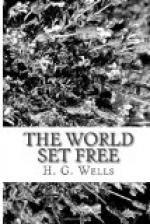He reflected. ‘No,’ he said.
Firmin cleared his throat. ‘I don’t think you are, sir,’ he said. ’You prefer——’
He stopped short. He had been going to say ‘talking.’ He substituted ‘ideas.’
‘That world of royalty!’ the king went on. ’In a little while no one will understand it any more. It will become a riddle....
’Among other things, it was a world of perpetual best clothes. Everything was in its best clothes for us, and usually wearing bunting. With a cinema watching to see we took it properly. If you are a king, Firmin, and you go and look at a regiment, it instantly stops whatever it is doing, changes into full uniform and presents arms. When my august parents went in a train the coal in the tender used to be whitened. It did, Firmin, and if coal had been white instead of black I have no doubt the authorities would have blackened it. That was the spirit of our treatment. People were always walking about with their faces to us. One never saw anything in profile. One got an impression of a world that was insanely focused on ourselves. And when I began to poke my little questions into the Lord Chancellor and the archbishop and all the rest of them, about what I should see if people turned round, the general effect I produced was that I wasn’t by any means displaying the Royal Tact they had expected of me....’
He meditated for a time.
’And yet, you know, there is something in the kingship, Firmin. It stiffened up my august little grandfather. It gave my grandmother a kind of awkward dignity even when she was cross—and she was very often cross. They both had a profound sense of responsibility. My poor father’s health was wretched during his brief career; nobody outside the circle knows just how he screwed himself up to things. “My people expect it,” he used to say of this tiresome duty or that. Most of the things they made him do were silly—it was part of a bad tradition, but there was nothing silly in the way he set about them.... The spirit of kingship is a fine thing, Firmin; I feel it in my bones; I do not know what I might not be if I were not a king. I could die for my people, Firmin, and you couldn’t. No, don’t say you could die for me, because I know better. Don’t think I forget my kingship, Firmin, don’t imagine that. I am a king, a kingly king, by right divine. The fact that I am also a chattering young man makes not the slightest difference to that. But the proper text-book for kings, Firmin, is none of the court memoirs and Welt-Politik books you would have me read; it is old Fraser’s Golden Bough. Have you read that, Firmin?’




